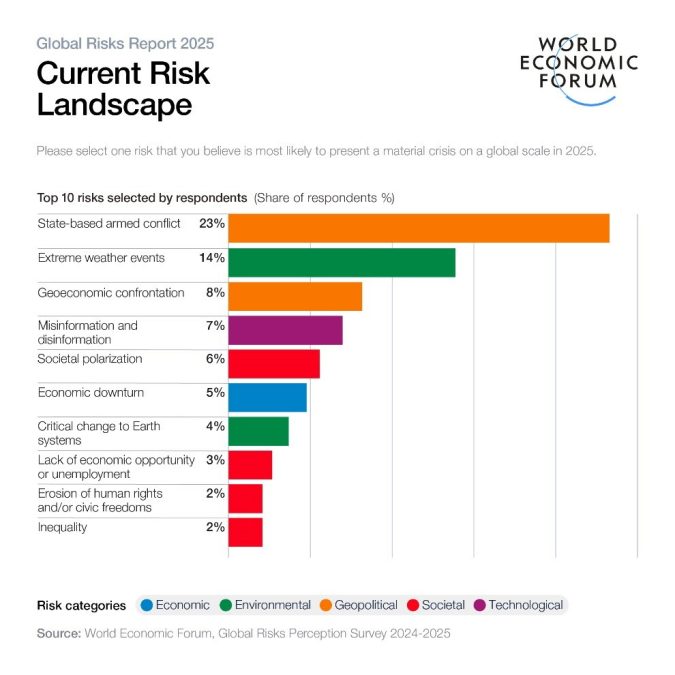Geneva, Switzerland – The World Economic Forum’s (WEF) 20th edition of the Global Risks Report paints a concerning picture of a world grappling with intensifying challenges. Released on Wednesday, the report underlines an increasingly fractured global landscape where geopolitical tensions, environmental degradation, and societal discord pose significant threats to stability and progress.
The findings, based on a survey of over 900 global risks experts, policymakers, and industry leaders conducted in late 2024, reveal that state-based armed conflict has emerged as the most pressing global risk for 2025. Nearly a quarter of respondents ranked it as their top concern, reflecting escalating geopolitical tensions and the fragmentation of international cooperation.
“Misinformation and disinformation remain top short-term risks for the second consecutive year,” the report highlights, noting their persistent threat to societal cohesion and governance. By eroding trust and exacerbating divisions, these risks complicate the urgent need for collaboration to address shared crises.
In the short term, extreme weather events, societal polarization, and cyber-espionage also rank prominently, underscoring a landscape fraught with challenges. However, the long-term outlook is dominated by environmental concerns, with risks such as biodiversity loss, ecosystem collapse, and critical changes to Earth’s systems taking center stage. Pollution, while primarily short-term in focus, also ranks high in long-term risks due to its health and ecological impacts.

“Rising geopolitical tensions and a fracturing of trust are driving the global risk landscape,” said Mirek Dušek, Managing Director at the WEF. “In this complex and dynamic context, leaders have a choice: to find ways to foster collaboration and resilience, or face compounding vulnerabilities.”
Environmental Risks and Long-Term Outlook
The report stresses that environmental risks will dominate over the next decade. Extreme weather events, a recurring concern in recent years, are identified as a top risk in the immediate, short-term, and long-term horizons. Alongside this, biodiversity loss, ecosystem collapse, and resource shortages threaten the delicate balance of global ecosystems.
Technology-related risks also feature prominently in the long-term outlook, with respondents expressing concerns over the adverse outcomes of AI technologies and the pervasive influence of misinformation.
“From conflicts to climate change, we are facing interconnected crises that demand coordinated, collective action,” said Mark Elsner, Head of the Global Risks Initiative at the WEF. “Renewed efforts to rebuild trust and foster cooperation are urgently needed. The consequences of inaction could be felt for generations to come.”
A Decisive Decade for Global Collaboration
The report highlights the urgency of global cooperation, especially as 64% of respondents anticipate a fragmented world order marked by competition among major and middle powers. This fractured environment threatens to undermine collective efforts to address shared challenges, from environmental degradation to societal inequality.
“Nearly two-thirds of respondents anticipate a turbulent or stormy global landscape by 2035,” the report states, citing the intensification of environmental, technological, and societal risks as key drivers.
Despite these grim projections, the report emphasizes that turning inward is not a viable solution. Instead, it calls for leaders to navigate these interconnected challenges through dialogue, stronger international ties, and innovative approaches to governance.
“As divisions deepen and fragmentation reshapes geopolitical and economic landscapes, the need for effective global cooperation has never been more urgent,” the report states.
A Call to Action
The Global Risks Report 2025 serves as a clarion call for action, urging leaders to prioritize rebuilding trust, enhancing resilience, and securing a sustainable and inclusive future. The WEF highlights the need for decisive, collective action to address immediate and long-term risks and avoid a downward spiral of instability.
Produced by the WEF’s Global Risks Initiative at the Centre for the New Economy and Society, the report aims to equip leaders with the foresight needed to navigate emerging challenges. “The decade ahead presents a pivotal moment for leaders to address the limitations of existing governance structures,” it concludes.
The report highlights that the choices made today will shape the world for generations to come, making collaboration and resilience the key to a stable and thriving future.

